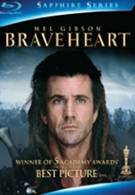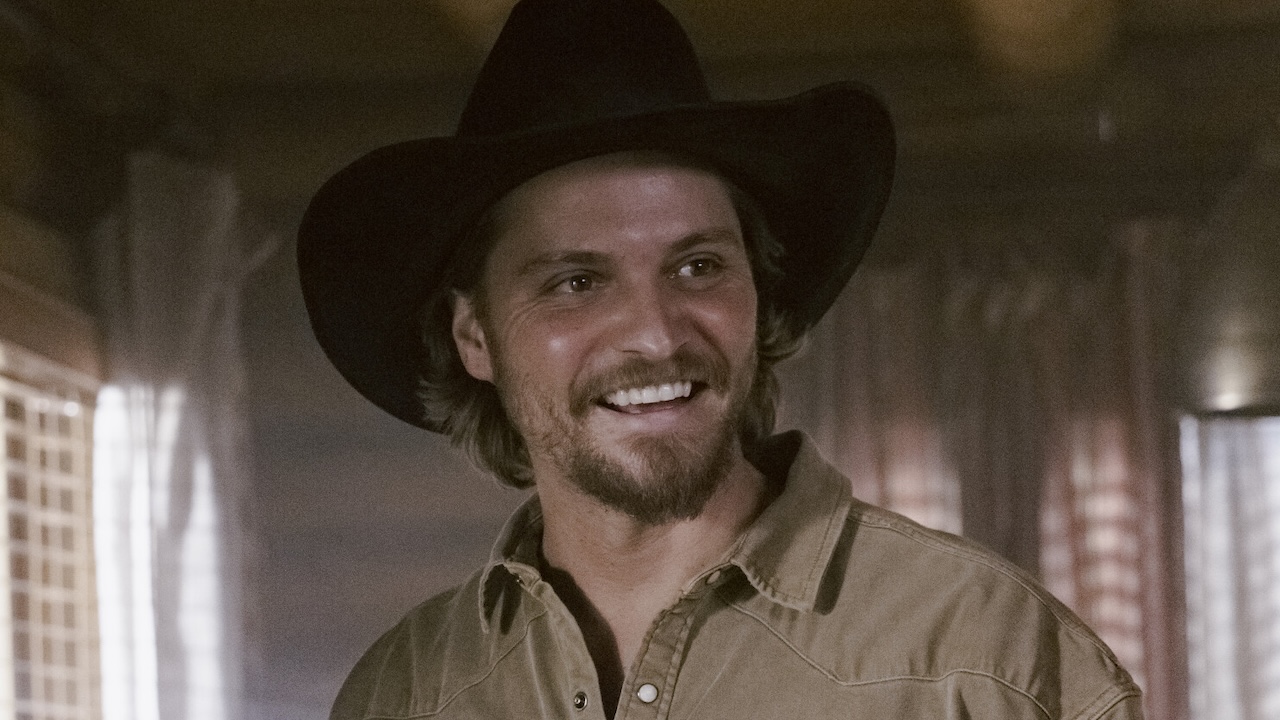Courage. It’s the word that best describes the experience of a movie like Braveheart. As the title suggests, it’s the human element closest to the soul of the story. Now, almost 15 years old and still going strong on home entertainment centers around the world, the film has come to Blu-ray with new perspectives on the film’s experience from its actors and director. Given that the movie was only the second Mel Gibson had directed, that he was also producing and playing the lead, and that the script called for the kinds of epic battle scenes that had rarely been done well on the screen in the last few decades, there was no small amount of daring involved in the production. And then, given the intense violence and nearly three-hour running time, it takes a bit of courage to sit through the movie as well.
William Wallace stands tall in Scottish history as the man credited with spearheading the nation’s rebellion in the 14th century against English tyrant Edward I, known as Edward Longshanks. Though history is full of myth and speculation surrounding Wallace, the film begins with many of the known accounts. As with most historical films, however, it only samples from the past and blends in fiction to tell its story, making the movie better suited for a literature classroom than a history lesson. Between the lack of accuracy and graphic violence, there are plenty of reasons to complain about the movie, but there are far greater reasons for accolades.
Wallace is a man whose desire for a personal life of peace is shattered when his wife is murdered. After he attacks an English soldier who was attempting to rape her, the local magistrate kills her to taunt Wallace into a confrontation. Driven not only by the need to avenge his wife’s death, but a yearning to end the same kinds of atrocities against his Scottish brethren, Wallace leads a commoner rebellion against Longshanks and the greedy Scottish nobles who have allied themselves with the English king. Committed to the point of martyrdom for his cause, Wallace devotes himself to winning what no Scotsman of his generation has ever known: freedom.
There was no small amount of nerve needed on the part of Gibson and his team when the movie was released in the summer of 1995. The movie struggled at first, with only small audiences in attendance. It gained steam as word of mouth got around about how good a film it actually was, and the momentum held when it was nominated for 10 Academy Awards, and again when it won in five of those categories, including Best Director and Best Picture. It would go on to stay in movie theaters for more than a year, a rare feat.
Its true success as a film stems first from Randall Wallace’s thundering script and fulgurant characters. Prior to Braveheart’s release, Wallace was a virtual unknown, penning only a handful of episodes for obscure television shows. Almost 15 years later, the film’s stirring words remain some of the most memorable in cinematic history, chock full of rousing speeches and quotable dialogue. Some lines are so impressive they’re practically legend. Toss out “Every man dies, not every man really lives” in your best Scottish to just about anyone and no doubt they’ll know exactly what movie it came from.
Along with the passionate script, Gibson’s sense for visual poetry and composer James Horner’s dramatic score combine to create an awesome revel for the eyes and the ears. The United Kingdom has beautiful landscapes, which Gibson and cinematographer John Toll use to full advantage. Horner’s music, which inspired themes for some of his later works, is one of his most haunting and chilling compositions. When the music is combined with the heartbreaking performances of Gibson and his co-stars, it’s hard to keep a dry eye during the movie’s stirring final chapter.
The sheer scope and viciousness of the movie’s battle scenes leave little to the imagination, and although the dizzying number of quick cuts sometimes makes it difficult to get a sense of what’s happening, they don’t lessen the cringe-worthiness or realistic viciousness of 14th-century battlefield warfare. At times all that gore registers as gratuitous, but there’s a dramatic honesty to the violence that accentuates the passion behind the Scottish struggle for freedom and keeps the bloodshed squarely out of the realm of wanton Tarantinoism.
Your Daily Blend of Entertainment News
With its gritty, realist design and wrenching brutality, Braveheart isn’t exactly a universally adored experience. More a film for fathers and sons than mothers and daughters, it still has an engaging and moving story. Without a doubt, it is an unforgettable cinematic experience for anyone willing to see it through to the end. As Blu-ray continues to unfold as the home entertainment format for the next decade, more and more favorites from the past are slowly being released in this new high definition package. With a movie like Braveheart, where the visuals and sound are of an Academy Award-winning caliber, expectations are particularly high.
Overall, this Sapphire Collection release surpasses expectation, in part because the previous DVD releases were less than satisfactory, especially where the sound was concerned. The transfer to 1080p high definition is gorgeous, maintaining the look and feel of the original film. There’s been little or no filtering and toying around with the quality, which leaves some scenes, particularly darker moments, looking noticeably grainy. Those moments are few and far between, leaving most of the film a jaw-dropping experience, from the bloody battle scenes to the breathtaking Scottish and Irish landscapes where the movie was filmed.
The update to the sound on this package is the real gem. Even on DVD the battles and soundtrack were muddy and muted, the result of compression. This time around the sound is full lossless quality. Clanging swords and whinnying horses sound clear, quiet dialogue has a new intensity, and every note of Horner’s score is as glorious as it ought to be. The entire film experience is as though someone has taken cotton balls out of your ears and cleaned the dust off the screen. If you’re a fan of Braveheart and have been waiting for an excuse to buy a Blu-ray player, now you’ve got one.
Mel Gibson offers up an honest, heartfelt commentary that’s a must-listen. Always complimentary of the work of his peers, and from time-to-time entertainingly self-effacing, he discusses aspects of the movie and story that impacted him the most both as an actor and as a filmmaker. Some directors get pedantic or fill up every second of their track with boring information. With Gibson it’s like having him sitting next to you on the couch, enjoying the movie right along with you, and letting you in on the inside jokes.
A double-disc package, this release reserves most of the extra material for the second disc. The must-watch extra is a new collection of interviews from the cast and crew, pulled together for a three-part feature titled “Braveheart: A Look Back.” Just over an hour long, it focuses on the cast and crew sharing stories about their experiences on and off camera. The movie has long since proven itself to be a masterpiece, so rather than feeling compelled to defend their work, the interviewees can relax and share more candidly why the process and collaborations worked so well.
History buffs will enjoy two brief documentaries, one about Smithfield, the setting for the movie’s final, gut-wrenching torture scene. “Smithfield: Medieval Killing Fields” is only tangentially related to the story of the movie itself, but it offers keen insights into the brutality of the England of the day. “Tales of William Wallace” is a half-hour-long exploration of the history of Wallace, filtering out fact from fiction. Any history teacher with a conscience will be sure to show this along with the film to help set imaginative students straight.
Writer Randall Wallace offers up a 20-minute interview describing his experience in writing Braveheart and his teaming with Gibson to bring the film to life. It’s a revealing, intriguing point-of-view piece that sheds light on where his version of Wallace originates and peels back the layers behind the process that was, for my money, the best piece of writing he’s ever done.
The package has some other extras rolled in, including an interactive time-line of the key battles and moments in Wallace’s real-life campaign. Decidedly missing are any featurettes on the CGI effects used in the film. That would be on account that there was no CGI used on the film. In this day and age where almost all action sequences in any movie involve some kind of computer aid, it’s hard to imagine that a movie made less than 15 years ago managed to do it without any. Take that fact, go back and watch the movie again, and enjoy once more the remarkable experience that is Braveheart.

